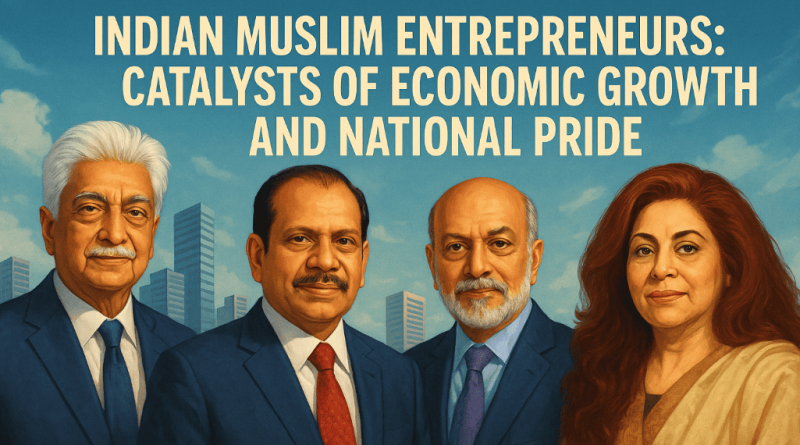Indian Muslim Entrepreneurs—Catalysts of Economic Growth and National Pride
Indian Muslim entrepreneurs today stand at the intersection of tradition and innovation, community and commerce, local impact and global reach.
In recent years, Indian Muslim entrepreneurs have risen as some of the most dynamic contributors to the country’s economy, bringing innovation, resilience, and social responsibility into sharp focus.
Their journeys reflect more than personal ambition—they mirror the aspirations of a community that has historically been woven into the fabric of India’s commerce, yet often overlooked in modern economic narratives. Today, their achievements stand as a testament to India’s diversity and as catalysts for inclusive national pride.
The Return of a Legacy
The entrepreneurial drive of Indian Muslims has deep historical roots. From traders on ancient caravan routes to craftsmen in Mughal bazaars, Muslim business families were central to India’s commercial traditions. What we are witnessing now is a revival of that heritage in new forms. Technology, globalization, and a growing appetite for innovation have allowed Muslim entrepreneurs to reassert their place in industries as varied as information technology, pharmaceuticals, retail, and beauty.
This resurgence has not happened in isolation. India’s broader transformation into an emerging economic powerhouse has created fertile ground for ambitious entrepreneurs to rise.
For many Muslims, entrepreneurship offers a means not just of financial success but of empowerment, visibility, and contribution to the nation’s progress. Their ability to balance traditional values with the demands of the global marketplace highlights the unique role they play in redefining India’s business ecosystem.
Icons of Innovation and Philanthropy
One cannot discuss Muslim entrepreneurship in India without mentioning figures such as Azim Premji, whose transformation of Wipro from a modest cooking oil company into an international IT giant redefined India’s place in the digital world. Premji’s contribution, however, extends far beyond business. His philanthropic work through the Azim Premji Foundation, where billions have been committed to education, underscores the principle that true entrepreneurship lies not only in profit-making but also in nation-building. He has become an emblem of how business leadership can be synonymous with social responsibility.
Equally remarkable is Yusuf Ali M.A., the force behind the Lulu Group. His expansion of hypermarkets and malls across India and the Gulf has generated thousands of jobs while promoting Indian products to international markets. His success story demonstrates how Indian Muslim entrepreneurs are capable of building global empires while remaining deeply tied to their communities.
Healthcare too has its champions. Dr. Habil Khorakiwala of Wockhardt has steered his company into the international pharmaceutical stage with a vision anchored in affordable healthcare. In a country where medical access remains uneven, his commitment to delivering essential medicines to underserved populations places him among those entrepreneurs whose legacies transcend business and touch lives directly.
The beauty sector was revolutionized by Shahnaz Husain, whose embrace of Ayurveda placed India firmly on the global cosmetic map. Her story is significant not merely as a tale of entrepreneurial triumph but as proof that India’s cultural heritage can fuel modern enterprise. By rebranding traditional remedies for international markets, she showcased the untapped potential of indigenous knowledge as a source of economic growth.
These figures, alongside countless lesser-known entrepreneurs across cities and towns, represent the layered reality of Muslim business in India: innovative, socially grounded, and globally competitive.
Impact Beyond Profit
The influence of Muslim entrepreneurship is not limited to boardrooms or market charts. It reverberates within communities. Their businesses are engines of employment, particularly for youth, and their investments in local initiatives—from schools to training programs—extend their impact far beyond the balance sheet.
According to the Federation of Indian Chambers of Commerce and Industry (FICCI), minority-run businesses make a substantial contribution to GDP and employment. The Muslim Chamber of Commerce and Industry, for instance, has provided an important platform for mentorship and networking, ensuring that budding entrepreneurs can access the guidance and capital necessary for growth.
In this sense, Muslim entrepreneurs act as both wealth creators and social reformers, embodying the ethos that prosperity must be shared.
Government Support and Policy
The Indian government has also recognized the significance of empowering minority entrepreneurs. Initiatives such as the Prime Minister’s Employment Generation Programme (PMEGP), Mudra Yojana, and Stand-Up India provide financial and technical assistance to those seeking to start businesses.
The Ministry of Minority Affairs’ Nai Manzil scheme combines skill development with education, targeting minority youth who might otherwise be excluded from economic opportunities.
State governments, such as Karnataka, have introduced policies to specifically promote Muslim entrepreneurship, acknowledging its potential to accelerate inclusive development. These programs are not merely welfare gestures—they represent an acknowledgment that Muslim entrepreneurs are vital to India’s sustainable economic growth.
Obstacles on the Path
Yet, it would be dishonest to claim the path has been smooth. Many Muslim entrepreneurs face systemic barriers, from difficulties in securing loans to the persistence of market stereotypes. Studies suggest that businesses run by Muslims often encounter higher scrutiny from financial institutions, with perceived risk often overshadowing merit.
Despite these challenges, resilience has defined their journeys. By building alternative networks of funding, relying on community support, and embracing innovation, they have demonstrated a capacity to thrive in adversity. Mentorship programs, workshops, and chambers of commerce have also played a role in equipping entrepreneurs with the financial literacy and resources to navigate these hurdles.
The Centrality of Education
If one factor stands out in these success stories, it is education. Leaders such as Premji have highlighted repeatedly that education is the foundation of entrepreneurship. By focusing on skill development, especially in science, technology, engineering, and mathematics (STEM), young Muslims are positioning themselves for success in emerging industries such as artificial intelligence, fintech, and biotechnology.
Partnerships with organizations like the National Skill Development Corporation (NSDC) are crucial in bridging the skill gap. Vocational training, internships, and mentorship programs are equipping Muslim youth to not just participate in the workforce but to lead enterprises that shape it.
Looking Ahead
The future of Muslim entrepreneurship in India is filled with promise. The next generation is already embracing technology-driven businesses, launching startups, and leveraging global markets. What makes this future particularly exciting is not just the potential for wealth creation, but the possibility of building enterprises that prioritize inclusivity, sustainability, and national pride.
To unlock this potential, India must continue to build an ecosystem that supports diversity in entrepreneurship. This requires reducing bureaucratic barriers, ensuring fair access to finance, and celebrating minority contributions to the economy. The narrative must shift from one of marginalization to one of recognition—that Muslim entrepreneurs are not exceptions but integral to India’s success story.
Indian Muslim entrepreneurs today stand at the intersection of tradition and innovation, community and commerce, local impact and global reach. They are redefining what it means to succeed in business by embedding within it the values of social responsibility, resilience, and inclusivity. Their contributions, both celebrated and unsung, remind us that diversity is not a burden but a strength—one that can drive India toward greater prosperity.
As India steps into a new chapter of economic ambition, the story of its Muslim entrepreneurs will remain central. They are not just contributors to the economy; they are catalysts for change, embodying the very spirit of a nation that thrives when all its citizens rise together.



